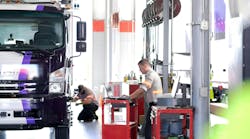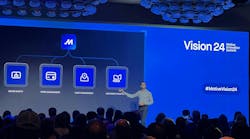The most effective way to protect a truck from hijackers, thieves and terrorists is to lock it and watch it. It's a simple enough recipe, and that may be the problem.
People love simple solutions, which means regulators and others charged with solving national security issues are quick to offer their simple solutions to the problem of securing trucks and their potentially hazardous cargos. However, like most things that seem simple in theory, the execution turns out to be far more complex.
Take the current padlock controversy, for example. When George Rodriguez, director of cargo security for the Transportation Security Administration, recently said he wanted every truck to be kept locked, it sounded like a reasonable step. Reasonable, that is, until you consider the true scope of fleet activity.
Putting aside the cost of fitting every trailer or truck cargo box with a padlock, there's the nightmare of controlling that many keys, storing them where drivers can find them easily and keeping them paired with the right lock. How much time will be lost looking for the right key, and how do you handle key security when you drop a trailer at a customer location? Padlocks can also be defeated with bolt cutters, so just how much security do you gain? Will fleets be expected to install different types of locks that will bring their own problems with retrofit installation and cost?
Keeping parked vehicles out of the wrong hands raises similar issues. When we park our cars, most of us lock the doors and take the keys with us. Once again, simple enough. But if you're dealing with a terminal that domiciles hundreds of trucks or tractors, key control becomes a huge problem.
The answer is probably some kind of device that links biometric identifiers like fingerprints to a truck's engine control system, but that will be considerably more expensive than a key and brings its own set of management problems.
Preventing unauthorized access to cargo and vehicles is certainly an important element in any industry security plan. Let's just not pretend it's an easy one.
Which brings us to the “Watch it!” rule. The proliferation of GPS location systems gives the casual observer the impression that tracking trucks as they go about their business would be a fairly simple way to make sure they aren't hijacked and diverted to sensitive areas where they could be used as terrorist weapons.
As this month's cover story points out, using remote monitoring systems for security purposes is far more complicated than slapping a GPS chip on a truck.
Again, an approach to truck security that sounds reasonable at first blush raises a whole range of cost and practicality issues.
Of course, difficulty and price shouldn't be insurmountable roadblocks to protecting ourselves against attacks on our domestic security. But as industry leaders, you owe it to trucking and to the country to speak up and make sure everyone understands just how difficult it will be to lock and watch the 11-million commercial vehicles moving on our roads. It's the only way we can develop a national security plan that actually works.
E-mail: [email protected]
Web site: fleetowner.com


